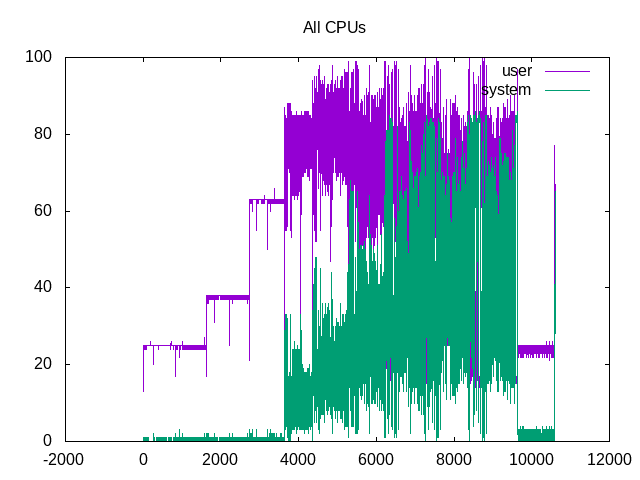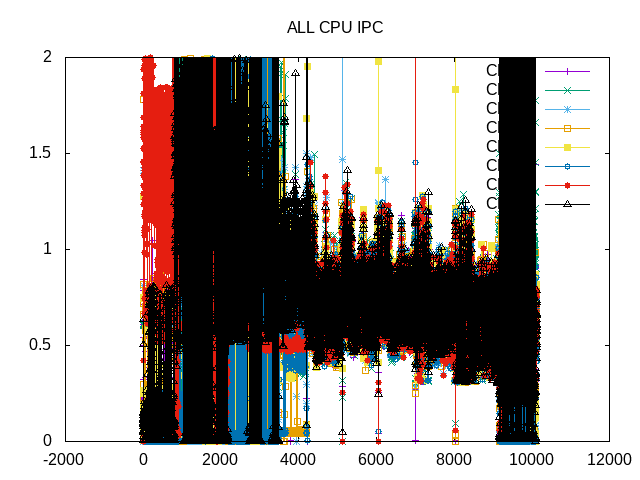OpenFOAM is free computational fluid dynamics (CFD) software. The OpenFOAM website includes download links for prebuilt packages including this download link for ubuntu. I installed the same version on both AMD and Intel reference platforms.
There is a benchmark page that runs an OpenFOAM “motorbike” workload from a tutorial page with varying numbers of processes.
Below are results of running this benchmark on both Intel and AMD reference systems. A few items to note:
- A single-threaded run is slightly faster on my AMD system than Intel system
- The fastest instance on Intel is 4 threads on this 4-core/8-hyperthread system, i.e. no hyperthreading
- In contrast the fastest instance on AMD is 16 threads on this 8-core/16 hyperthread system, i.e. with hyperthreading. Not certain if this is different saturation points for the memory controllers or something that could benefit from better “pinning” discipline. Also interesting to see the On_CPU on Intel never get over 95%.
- One we get to optimal, further threads degrade performance rather than help, so optimal thread numbers are important for this workload and potentially others
| # of threads | Intel Wall Time | Speedup | IPC | On_CPU | AMD Wall Time | Speedup | IPC | On_CPU |
|---|---|---|---|---|---|---|---|---|
| 1 | 1520.487 | 1.0 | 1.402 | 12.5% | 1335.804 | 1.0 | 1.639 | 6.2% |
| 2 | 1041.154 | 1.5 | 1.255 | 24.9% | 885.919 | 1.5 | 1.563 | 12.4% |
| 4 | 661.560 | 2.3 * | 0.933 | 49.8% | 594.509 | 2.2 | 1.545 | 24.8% |
| 6 | 725.547 | 2.1 | 0.830 | 74.7% | 471.903 | 2.8 | 1.476 | 37.1% |
| 8 | 730.087 | 2.1 | 0.750 | 88.1% | 464.527 | 2.9 | 1.404 | 49.4% |
| 12 | 841.820 | 1.8 | 0.786 | 91.0% | 460.100 | 2.9 | 1.095 | 74.1% |
| 16 | 814.016 | 1.9 | 0.797 | 93.1% | 438.226 | 3.0 * | 0.876 | 98.4% |
| 20 | 949.668 | 1.6 | 0.794 | 94.1% | 536.027 | 2.5 | 0.934 | 99.1% |
| 24 | 1014.564 | 1.5 | 0.772 | 94.9% | 579.935 | 2.3 | 0.910 | 99.2% |
Metrics (Intel) - openfoam/motorbike
One script successively runs 1, 2, 4, 8, 12, 16, 20 and 24 as well as some post-processing. Below the metrics are broken out for several of these runs
Allmesh - pid 29947 // 1 On_CPU 0.125 On_Core 0.999 IPC 1.402 Retire 0.282 (28.2%) FrontEnd 0.025 (2.5%) Spec 0.108 (10.8%) Backend 0.585 (58.5%) Elapsed 1631.38 Procs 8 Maxrss 3689K Minflt 13927669 Majflt 0 Inblock 24 Oublock 1651800 Msgsnd 0 Msgrcv 0 Nsignals 0 Nvcsw 61 (5.1%) Nivcsw 1138 Utime 1617.801980 Stime 12.369647 Start 107834.21 Finish 109465.59 Allmesh - pid 30130 // 4 On_CPU 0.498 On_Core 3.988 IPC 0.933 Retire 0.416 (41.6%) FrontEnd 0.188 (18.8%) Spec 0.188 (18.8%) Backend 0.208 (20.8%) Elapsed 905.33 Procs 36 Maxrss 1138K Minflt 7155228 Majflt 21 Inblock 16 Oublock 1690016 Msgsnd 0 Msgrcv 0 Nsignals 0 Nvcsw 8491 (71.6%) Nivcsw 3365 Utime 3598.138739 Stime 12.178645 Start 110563.46 Finish 111468.79 Allmesh - pid 30304 // 8 On_CPU 0.881 On_Core 7.046 IPC 0.750 Retire 0.333 (33.3%) FrontEnd 0.200 (20.0%) Spec 0.147 (14.7%) Backend 0.320 (32.0%) Elapsed 922.39 Procs 56 Maxrss 802K Minflt 5365023 Majflt 38 Inblock 24 Oublock 1724592 Msgsnd 0 Msgrcv 0 Nsignals 0 Nvcsw 15305 (0.1%) Nivcsw 25660292 Utime 5160.536924 Stime 1338.942608 Start 112196.38 Finish 113118.77 Allmesh - pid 30532 On_CPU 0.931 On_Core 7.446 IPC 0.797 Retire 0.336 (33.6%) FrontEnd 0.180 (18.0%) Spec 0.143 (14.3%) Backend 0.340 (34.0%) Elapsed 1031.02 Procs 96 Maxrss 718K Minflt 3186363 Majflt 52 Inblock 56 Oublock 1810112 Msgsnd 0 Msgrcv 0 Nsignals 0 Nvcsw 27334 (0.0%) Nivcsw 308446440 Utime 4362.069275 Stime 3314.615273 Start 114062.55 Finish 115093.57
A few overall things to note: (a) the amount of system time is proportionally high, particularly when we have more than 4 threads. The amount of I/O blocks written or voluntary context switches suggest this isn’t I/O but perhaps some other forms of system contention e.g. shared memory? that likely starts limiting performance (b) the percentage of speculative misses are higher, though also different metric than I see with the overall “topdown” (c) otherwise backend and memory seems to dominate and limit.
Metrics (AMD) - openfoam/motorbikeAllmesh - pid 4196 // 1 On_CPU 0.062 On_Core 0.997 IPC 1.639 FrontCyc 0.000 (0.0%) BackCyc 0.000 (0.0%) Elapsed 1335.80 Procs 8 Maxrss 3669K Minflt 10685964 Majflt 6 Inblock 1960 Oublock 1651920 Msgsnd 0 Msgrcv 0 Nsignals 0 Nvcsw 73 (0.1%) Nivcsw 130138 Utime 1323.922851 Stime 8.315829 Start 6978.13 Finish 8313.93 Allmesh - pid 4291 // 4 On_CPU 0.248 On_Core 3.967 IPC 1.545 FrontCyc 0.000 (0.0%) BackCyc 0.000 (0.0%) Elapsed 594.51 Procs 36 Maxrss 1138K Minflt 6792141 Majflt 23 Inblock 144 Oublock 1689152 Msgsnd 0 Msgrcv 0 Nsignals 0 Nvcsw 7921 (3.3%) Nivcsw 229242 Utime 2346.044338 Stime 12.437106 Start 9199.87 Finish 9794.38 Allmesh - pid 4425 // 8 On_CPU 0.494 On_Core 7.907 IPC 1.404 FrontCyc 0.000 (0.0%) BackCyc 0.000 (0.0%) Elapsed 464.53 Procs 56 Maxrss 780K Minflt 5773120 Majflt 47 Inblock 544 Oublock 1713440 Msgsnd 0 Msgrcv 0 Nsignals 0 Nvcsw 12114 (3.3%) Nivcsw 354717 Utime 3650.304180 Stime 22.769123 Start 10266.36 Finish 10730.89 Allmesh - pid 4571 // 16 On_CPU 0.984 On_Core 15.750 IPC 0.876 FrontCyc 0.000 (0.0%) BackCyc 0.000 (0.0%) Elapsed 438.22 Procs 96 Maxrss 720K Minflt 2985604 Majflt 79 Inblock 536 Oublock 1775192 Msgsnd 0 Msgrcv 0 Nsignals 0 Nvcsw 22650 (3.1%) Nivcsw 700796 Utime 5656.053236 Stime 1245.739203 Start 11191.02 Finish 11629.24
AMD shows a similar jump in system time once we go over the 8 physical cores. IPC might not be the best metric here since it seems at some point we’re limited by backend memory stalls. However, the IPC on AMD is consistently higher than the Intel system.
Using “perf record” to look at where the time is spent and then looking at the kernel symbols
5.15% simpleFoam [kernel.kallsyms] [.] syscall_return_via_sysret
1.95% simpleFoam [kernel.kallsyms] [k] __schedule
1.73% simpleFoam [kernel.kallsyms] [k] copy_pte_range
1.70% simpleFoam [kernel.kallsyms] [k] update_curr
1.52% simpleFoam [kernel.kallsyms] [k] pick_next_task_fair
1.45% simpleFoam [kernel.kallsyms] [k] unmap_page_range
1.09% simpleFoam [kernel.kallsyms] [k] do_syscall_64
1.03% simpleFoam [kernel.kallsyms] [k] entry_SYSCALL_64_after_hwframe
0.85% simpleFoam [kernel.kallsyms] [k] __calc_delta
0.82% simpleFoam [kernel.kallsyms] [k] pick_next_entity
0.70% simpleFoam [kernel.kallsyms] [k] yield_task_fair
0.63% simpleFoam [kernel.kallsyms] [k] _raw_spin_lock
0.59% simpleFoam [kernel.kallsyms] [k] sys_sched_yield
0.52% simpleFoam [kernel.kallsyms] [k] update_min_vruntime
0.46% simpleFoam [kernel.kallsyms] [k] native_sched_clock
0.44% simpleFoam [kernel.kallsyms] [k] clear_page_erms
0.43% simpleFoam [kernel.kallsyms] [k] rcu_note_context_switch
0.39% simpleFoam [kernel.kallsyms] [k] free_pages_and_swap_cache
0.36% simpleFoam [kernel.kallsyms] [k] entry_SYSCALL_64_stage2
0.36% simpleFoam [kernel.kallsyms] [k] release_pages
0.34% simpleFoam [kernel.kallsyms] [k] update_rq_clock
0.34% simpleFoam [kernel.kallsyms] [k] __indirect_thunk_start
0.33% simpleFoam [kernel.kallsyms] [k] cpuacct_charge
0.32% simpleFoam [kernel.kallsyms] [k] __cgroup_account_cputime
0.30% simpleFoam [kernel.kallsyms] [k] schedule
0.28% simpleFoam [kernel.kallsyms] [k] copy_user_enhanced_fast_string
0.27% simpleFoam [kernel.kallsyms] [k] cgroup_cpu_stat_updated
0.26% simpleFoam [kernel.kallsyms] [k] page_remove_rmap
0.25% simpleFoam [kernel.kallsyms] [k] _vm_normal_page
0.25% simpleFoam [kernel.kallsyms] [k] clear_buddies
0.23% simpleFoam [kernel.kallsyms] [k] get_page_from_freelist
0.23% simpleFoam [kernel.kallsyms] [k] check_cfs_rq_runtime
0.22% simpleFoam [kernel.kallsyms] [.] native_irq_return_iret
0.20% addr2line [kernel.kallsyms] [k] copy_user_enhanced_fast_string
0.17% simpleFoam [kernel.kallsyms] [k] native_queued_spin_lock_slowpath
0.17% simpleFoam [kernel.kallsyms] [k] sched_clock_cpu
0.16% simpleFoam [kernel.kallsyms] [k] swapgs_restore_regs_and_return_to_usermode
0.16% simpleFoam [kernel.kallsyms] [k] error_entry
0.13% simpleFoam [kernel.kallsyms] [k] __switch_to
0.13% simpleFoam [kernel.kallsyms] [k] handle_pte_fault
0.13% simpleFoam [kernel.kallsyms] [k] sched_clock
0.11% addr2line [kernel.kallsyms] [k] clear_page_erms
0.10% simpleFoam [kernel.kallsyms] [k] __handle_mm_fault
0.10% simpleFoam [kernel.kallsyms] [k] free_pcppages_bulk
Looking at the routines with over 0.10% of the time, seems like memory management and process scheduling come highest on the list with some time also spent in syscalls. I wonder if the overall virtual memory size limits are introducing issues here.

The sum of time scheduled for all cores, shows the 1, 2 and 4 having minimal system time and overall scheduled almost 12.5%, 25.0% and 50.0% respectively. After this, system time climbs and the overall scheduling also seems more volatile. The post-process time at the end is also more well-behaved and looks like it is mostly single-threaded. Breaking this out by individual core usage doesn’t help much because of the extra noise.
Process Tree - openfoam/motorbike
Process Tree
The process tree is a bit more complex, below are the processes run in a 4-core version
30130) Allmesh
30131) cp
30132) surfaceFeatureE
30133) blockMesh
30134) decomposePar
30135) Allmesh
30136) foamDictionary
30137) mpirun
30142) snappyHexMesh
30143) snappyHexMesh
30144) snappyHexMesh
30145) snappyHexMesh
30146) snappyHexMesh
30147) snappyHexMesh
30148) snappyHexMesh
30149) snappyHexMesh
30150) snappyHexMesh
30151) snappyHexMesh
30152) snappyHexMesh
30153) snappyHexMesh
30138) mpirun
30139) mpirun
30140) mpirun
30141) mpirun
30186) ls
30187) xargs
30188) rm
30189) rm
30190) rm
30191) rm
30192) ls
30193) xargs
30194) cp
30195) cp
30196) cp
30197) cp

The IPC reflects some noise in different sections of the code, even with low numbers of threads.
 About this graph
About this graph
The noise is also reflected in the topdown metrics graph. However, overall dominance of backend memory stalls is still apparent.
on_cpu 0.605 elapsed 10183.010 utime 39507.432 stime 9782.333 nvcsw 289898 (0.00%) nivcsw 7970072700 (100.00%) inblock 544 onblock 16475720 retire 0.366 ms_uops 0.071 speculation 0.069 branch_misses 42.21% machine_clears 57.79% frontend 0.184 idq_uops_delivered_0 0.057 icache_stall 0.003 itlb_misses 0.011 idq_uops_delivered_1 0.079 idq_uops_delivered_2 0.104 idq_uops_delivered_3 0.129 dsb_ops 51.69% backend 0.381 resource_stalls.sb 0.016 stalls_ldm_pending 0.409 l2_refs 0.012 l2_misses 0.005 l2_miss_ratio 39.16% l3_refs 0.003 l3_misses 0.001 l3_miss_ratio 52.26%
These metrics are for the entire run of two and a half hours and as seen above the workloads differ some particularly for more than 4 threads. However, overall shows a lower level of speculation with some machine clears contributing more than branch misses. It also shows a high rate of iTLB misses suggesting a large working set size. Approximately half the uops come from the uop cache. Otherwise, the backend stalls are high with high cache-miss ratios.
